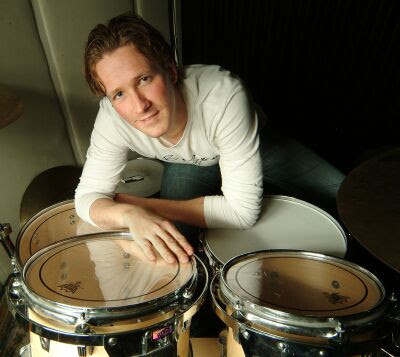Jeroen Vrolijk of The Netherlands just sent me this:
For my friend Mark,
Lately I’ve been working with a companies from the Northern part of Holland. I’m doing workshops with schoolkids and young adults called “Beat your H’art out”. I provide drumming opportunities for those in the corporate world also. It’s an amazing experience and a great opportunity. I’ve assisted in providing drumming and rhythm to corporations such as Albert Hein, the city of
This autumn it’s all been about drums and spreading the rhythm! The Autumn/winter is shaping up as a very busy time, with more companies wanting to share in the power of drums.
What I know is that, because of the wonderful learning experiences I’ve had at these schools, I can bring a deeper knowledge of how music and rhythm affects us all.
Check out: http://www.jeroenvrolijk.nl/
Many people want to feel that they are part of something.
Music can do this.
People want to feel special.
Music Can Do This.
People want to stretch out and create.
Music Can Do This.
Drumming can enhance relationships, build teamwork, help in solving problems, create an incredibly challenging experience, and be just plain fun. If you’d like more info about my work in this “other” drumming field, hey just ask me. info@jeroenvrolijk.nl
Here are some very important and, I think, interesting facts and findings. (Thanks to my good friend Chuck Silverman in LA,
College-bound seniors with coursework or experience in music performance scored 52 points higher on the verbal portion and 37 points higher on the math portion of the SAT than students with no coursework or experience in the arts. (Source: The College Board, September 1997) * Music and Spatial Task Performance: A Causal Relationship Music lessons, and even simply listening to music, can enhance spatial reasoning performance, a critical higher brain function necessary to perform complex tasks including mathematics. (Source: Frances Rauscher, Ph.D., Gordon Shaw, Ph.D., University of California, Irvine, 1994)Regards,
Music training, specifically piano instruction, is far superior to computer instruction in dramatically enhancing children’s abstract reasoning skills necessary for learning math and science. Learning music at any age causes long-term enhancement of spatial-temporal reasoning. (Source: Frances Rauscher, Ph.D., Gordon Shaw, Ph.D., University of California, Irvine, 1997)
Music -specifically song is one of the best training grounds for babies learning to recognize the tones that add up to spoken language. (Source: Sandra Trehub, University of Toronto, 1997)
Music benefits older adults. Active music-making positively affects the biology and behavior of Alzheimer’s patients. (Source: Music Making and Wellness Project, a study conducted at the University of Miami)
Rhode Island studies have indicated that sequential, skill-building instruction in art and music integrated with the rest of the curriculum can greatly improve children’s performance in reading and math. (Source: “Learning Improved by Arts Training” by Martin Gardiner, Alan Fox, Faith Knowles, and Donna Jeffrey, Nature, May 23, 1996)
* The Mozart Effect surfaced when research uncovered that adults who listened to music of complexity for ten minutes or so experienced temporary increases in their spatial IQ scores. (Source: Frances Rauscher, Ph.D., Gordon Shaw, Ph.D., University of California, Irvine, 1993-1994
…………………………..
So What: Music is good for you, your company and your kids. Turn the radio on
